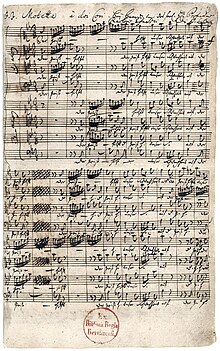Der Geist hilft unser Schwachheit auf, BWV 226
| Der Geist hilft unser Schwachheit auf | |
|---|---|
| BWV 226 | |
| Motet by J. S. Bach | |

Manuscript
|
|
| Key | B-flat major |
| Occasion | Funeral of Johann Heinrich Ernesti |
| Performed | 21 October 1729: Paulinerkirche, Leipzig |
| Movements | 3 |
| Bible text | |
| Chorale | Komm, Heiliger Geist, Herre Gott |
| Vocal | 2 choirs SATB |
| Instrumental | strings with choir I, woodwinds with choir II, continuo |
Der Geist hilft unser Schwachheit auf (The Spirit gives aid to our weakness), BWV 226, is a motet by Johann Sebastian Bach, composed in Leipzig in 1729 for the funeral of Johann Heinrich Ernesti.
For Der Geist hilft unser Schwachheit auf , the autograph score survives. Bach himself noted on its title: "J. J. Motetta à doi Cori bey Beerdigung des seel. Hrn. Prof. und Rectoris Ernesti di J. S. Bach." (Jesu Juva – Motet for two choirs for the funeral for the blessed Rector, Professor Ernesti, by J. S. Bach). Ernesti was professor of poetry at Leipzig University and director of the Thomasschule. Scholars debate if the date of the first performance (which took place in the Paulinerkirche, the university church), was 24 October, or rather 21 October, as indicated by the title page of the sermon.
As well as being one of Bach's funeral motets, the work can be classified as part of another series, being one of twelve surviving pieces (which are mainly festive in character) for Leipzig University, Festmusiken zu Leipziger Universitätsfeiern.
The text is taken from the Epistle to the Romans () and Martin Luther's third stanza to the hymn "Komm, Heiliger Geist, Herre Gott" (1524). Ernesti himself had chosen the text from the epistle for the funeral sermon.
The motet is structured in three movements and scored for two four-part choirs. They sing together in movements 2 and 3. The orchestral parts are extant, indicating that choir I was doubled by strings, choir II by reeds (two oboes, taille and bassoon). For the basso continuo, separate violone and organ parts are provided.
...
Wikipedia
